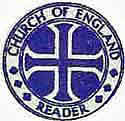| Admin |
| Home Contents email |
| H&S Policy Safeguarding |
| The Church in the World |
| Faith / Church |
| Things Past |
| People & Features |
Christian Events and Organisations
.

As well as the Seasons and Major Festivals which help us worship God, the church celebrates several 'Special Days' throughout the year to remember, honour and support each other and our work in God's world. Celebration of the "Special Days" is usually optional, Christians chose which they want to remember, including: (Return to top)
The 'Special Days'
.
| January | Plough Sunday |
| February | Education Sunday |
| March | Mothering Sunday |
| April | Rogation |
| May | Christian Aid Week |
| June | Fathers Day Reader Sunday |
| July | Sea Sunday |
| August | |
| September | Racial Justice Sunday Harvest Festival |
| October | Disability Sunday Animal Welfare Sunday Hospital Sunday |
| November | All Saints Day, All Souls Day Remembrance Sunday |
| December | Nine Lessons and Carols Christingle Service |
Readers were created as 'Lectors' in the time of Elizabeth I when there were not enough priests of the new Protestant faith to be allocated to each parish ('Lector' comes from the Latin for 'Read'). When there was no priest to take a Service in a church, suitable men of sober behaviour and sufficient learning were licensed to read the Service of Morning Prayer or Evening Prayer from the new Prayer Book. Originally they were not allowed to preach, merely to read the Service, and they were not allowed into the Sanctuary (the area around the altar table) so they had to leave the collection plate on the floor at the entrance to the Sanctuary. The Office of Lector had died out by the time of Oliver Cromwell (17th century). (Return to top)
The Office was resurrected in 1866 when the Bishop of Gloucester licensed the first modern 'Reader', at first just men, but women were admitted in 1968 and the ratio of men to women is now about equal. Gradually over time, the duties of the Reader have been expanded and they are now allowed to lead the whole Service and do much as a priest can (including entering the Sanctuary!), except they may not 'preside' at Holy Communion (bless the bread and wine), take marriages and baptisms, absolve sins, or give a blessing. (Return to top)

A Reader is not the 'vicar's little helper' but is a separate ministry (calling), although most Readers operate under the authority of a priest. You may of course see a Reader helping the priest in a church Service, or visiting in the Parish, or helping to lead a House/Study Group, but you will also see a Reader taking a Service, visiting, or leading a group on their own. Readers are trained in Theology and Ministry, often on the same course as priests, although they are not ordained (set-apart) but remain part of the laity, supporting themselves through full-time employment. (Return to top)
Consequently, Readers can be found not just in parish churches but as Chaplains in prisons (technically 'Assistant Chaplains'), old folks' homes, schools, etc. There are now as many active Readers in the Church of England as there are priests (over 10,000), and there may even be more Readers! (Return to top)
 St Mary's Church, Dymock
St Mary's Church, Dymock